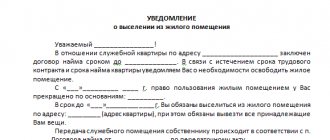Is it possible to evict from a service living space?
Such real estate belongs to the specialized housing stock . Eviction from it, if necessary, is possible, but with a number of exceptions. And there are a lot of them.
Judicial practice in such cases is ambiguous. If the matter is controversial, and often it is, then the one who shows more persistence will win it. Many nuances in such proceedings lead to the fact that when applications are submitted to different courts (for example, the district and Supreme), they can issue different verdicts. And there are examples of this.
Article 103 of the Housing Code of the Russian Federation is the main one for considering issues of eviction from official housing in Russia, as well as exceptions and nuances. When drawing up an application, it is worth indicating this as the basis. But the requirements for residence, as well as the specifics of drawing up the contract, are specified in Articles 92-109 of the Housing Code.
Along with the residential complex, the previous code from the times of the USSR is still applied. If some articles from it do not contradict the modern version, then they are used for a more correct decision on the case under consideration.
The Housing Code of the Russian Federation in its modern form has existed since March 1, 2005. Some points are not taken into account at all, i.e. it is impossible to determine from it how to interpret individual situations.
A person can be evicted from official housing:
- The owner of the premises is the lessor. As a rule, this is the organization that provided the apartment - the employer, for example. It happens that there is a transition from one owner to another, and the tenant is asked to move out.
- The formal tenant of the living space. A person or family living in an apartment provided by an organization.
Consequently, it is impossible to evict people from the neighboring apartment from service housing - you can only complain about them to the landlord. The tenant himself can ask for the eviction of those with whom he shares the same living space.
Who sues and which side they take depends on the circumstances. In particular, from who is planned to be evicted and for what reason.
When moving into a service apartment, a contract is signed. Often it is compiled independently by the owner of the premises. In the future, the organization may indicate any clauses of this agreement, according to which the person must move out. But these conditions cannot contradict the articles of the LC. If this happens, the court is obliged to invalidate them.
A person can be evicted provided that he:
- there is somewhere to move;
- provided other housing;
- given a period to eliminate the causes of claims, if they were the reason for filing a lawsuit;
- sufficient time was given to vacate the premises and find another place to live.
Legal provisions regarding the eviction of a pensioner
Pensioners include men aged 60 and women aged 55.
This is a category of citizens that is less socially protected than others. Therefore, the state guards their interests and rights. The legislation protects older people especially scrupulously when the question of their eviction arises. This means that a similar measure applies to pensioners, but with some reservations. In particular:
- Making a decision on this issue falls solely within the powers of the court.
- The resettlement of a pensioner is considered by the court individually in each specific situation.
- The directives of the Supreme Court Resolution No. 14 and Art. 103 Housing Code of the Russian Federation .
At the same time, the general grounds for evacuation from municipal, private, official housing or a hostel are applied to them. The rationale is clear: the legislation is the same for all categories of Russian citizens and regardless of their place of residence.
With a minor child?
Unlike many other situations, there is no strict restriction for eviction of a minor child under 18 years of age from service housing . There are a number of persons who cannot be expelled from the premises; minors are not included in this list.
If the court finds the grounds for forcibly vacating the premises sufficient, then citizens under 18 years of age will not become an obstacle. The only thing the defendant can do in this case is to try to challenge the decision.
It is quite difficult to evict a minor not from an official premises, but from any other residential premises, which we talk about in detail here.
Who can't be evicted?
The current legislation of the Russian Federation identifies certain categories of citizens who cannot be evicted under any circumstances. The exception is cases where they received the right to reside there before 2005.
The categories of citizens who cannot be evicted include the following:
- Veterans of the Great Patriotic War, including combatants;
- Family members of WWII participants, USSR military personnel, partisans;
- Disabled law enforcement officers during the USSR;
- Persons whose continuous service experience in the relevant department (body or structure) exceeds 10 years;
- Citizens living in residential premises owned by the USSR Ministry of Defense;
- Single workers with dependent young children;
- Residents who are recognized as in need of improved housing conditions and are in line to receive an apartment.
Causes
For what reasons are people evicted from a service apartment? There are many reasons for a citizen to be asked to vacate an office premises.
The interested party can be both the landlord and people living in the same apartment/room.
The main reasons why people usually go to court for eviction (subject to refusal to vacate the premises):
- The term of the contract, according to which the citizen was supposed to use this housing, had expired.
- The composition of the family has changed - for example, a couple divorced.
- Termination of the contract due to violation of its terms by the employer.
- The property has passed into the possession of another owner.
- The tenant did not pay bills for the use of residential premises and utilities (you will learn how eviction from a municipal apartment occurs for the same reason here).
- Termination of activities during which official housing was provided.
- If a resident interfered with neighbors by his behavior, systematically violated their legitimate interests and rights.
- If the original contract for the provision of living space was declared invalid.
A person who is being disturbed by a neighbor from another premises (apartment, dorm room) cannot sue for eviction on his own . However, he can collect the signatures of other tenants, their statements and confirmations, and then complain to the landlord. And the issue of depriving a citizen of the right of residence will be resolved through the court.
On what grounds?
The grounds for eviction are provided for by law. This is either the end of the term, or a violation of the terms of the contract, or early termination of the agreement to rent a service apartment.
Main reasons for eviction:
- transfer of premises to non-residential stock;
- accident rate of the building in which the apartment is located;
- seizure of land by the state for its own needs;
- threat to the life and health of children (if the tenant has been deprived of parental rights);
- leaving for another place of residence without notifying the owner;
- change of owner of the enterprise where the tenant works;
- failure to pay utility bills for six months.
The reason for the owner's claims may also be regular violations of the rights of neighbors by residents , for example:
- noise in the evening;
- fires;
- unsanitary behavior;
- exploitation of housing for purposes other than its intended purpose (for example, for drug trafficking, underground casinos, etc.).
Naturally, those who moved into the apartment without permission will also be evicted.
The reason for breaking the lease agreement is also illegal redevelopment , which worsened the living conditions of the neighbors. You can also leave a company apartment if a fixed-term contract has come to an end, or the employee quit of his own free will, staff reduction, or due to a disciplinary offense.
The standard rental agreement for a service apartment was approved by Government Decree No. 42. In the document, in particular, one can see the grounds for early termination of the agreement.
Options for deprivation of housing
There are only two options for deprivation of housing:
- Provided otherwise.
- No provision.
In the first case, all responsibility falls on the owner institution, in the second - on the employer.
The decision depends on the circumstances of the case and how realistic it is for the citizen to find another place of residence and pay for it.
In what cases, according to the law, is it possible to evict a person without providing him with another living space, we described in this material.
Who is it intended for?
The use of specialized housing stock is not available to all citizens of our country. In order to transfer an apartment for use, you must obtain permission from the authorities . Privileges are addressed only to employees and their close relatives.
Who has the right to live in official housing:
- Those working under an employment contract with state or municipal institutions (rural teachers, engineers, doctors).
- Citizens working in unitary enterprises owned by the state.
- Military personnel, employees of the Ministry of Internal Affairs, Ministry of Emergency Situations, GUVM, FSB and other law enforcement agencies.
- Persons holding public or elected positions (deputies).
If an employee has separate housing in the region where he is serving, he will be denied an apartment from a specialized fund. Employees registered with social security will receive housing among the first wave of those in need.
Denial of right of residence
Denial of the right to reside in office premises is possible only through the court, and in this way the landlord or tenant often achieves the desired result. But there are categories of citizens who cannot be evicted without certain conditions.
The following are protected by law in this regard:
- The family of a person who worked for the company that owns the living space.
- Pensioners on old-age pensions.
- Families of people who died or went missing in the line of duty while working in an organization or department that provides housing.
- People who were seriously injured or suffered deterioration of health while working at an enterprise or during service. Such cases include injury, contusion, wounds, work-related injuries, as well as the development of occupational diseases. This means that health problems arose precisely while working/serving in the organization providing this living space.
- Orphans and children left without parental care. At the same time, the age of 18 is not the limit - after reaching it, the right to housing remains with them.
These people can only be evicted if they are provided with alternative housing. However, there are exceptions. People in this category may be deprived of living space if they have their own property. Or if their close relatives have an apartment where they “fit” according to the standards of square meters per person. This could be their parents or children.
Also an exception are situations when residents from the above category of citizens are not listed as employers themselves and are not related to the employer. For example:
- In fact, the person who died in the line of duty has a family - a wife and child. But the marriage is not formally registered, the father is not listed on the birth certificate. In this case, the landlord has the right to evict the family.
- Family relations were terminated.
There are also other categories of people who cannot be evicted , but only if they became tenants before March 1, 2005:
- Family members of military personnel or equivalent.
- They work for the landlord, but have changed positions.
- They were laid off in the organization that owns the living space, or the institution was liquidated.
- They are military veterans.
- They have been working for the landlord, who is the owner of the residential premises, for more than 10 years.
- They live with minor children.
It turns out that children are subject to the impossibility of eviction only if the family rented the premises before the beginning of March 2005 . For 2021, these are persons at least 11 years of age, and over time this part of the law will simply go away due to inconsistency.
Even if a person can be legally evicted upon termination of family relationships, and the landlord tries to do this, the tenant’s word carries great weight. If he does not agree, then the person can be allowed to continue living in the apartment.
What categories of citizens may be difficult to deal with?
Difficulties may arise during eviction, especially in cases where socially vulnerable citizens or children live in the apartment. To make the rounds, it will be necessary either to provide alternative housing, or to obtain evidence for the court that will confirm the tenant’s guilt, the availability of other housing, the consent of the guardianship authorities, etc.
Minor child
It is quite difficult to evict children under 18 years of age without providing another apartment , although formally the owner of a service apartment has every right to do so (read about the nuances of eviction without providing another living space here). Until the parents find another place to live, the child can formally remain in the service premises. You can petition the court to postpone the execution of the eviction decision, but it is impossible to delay this process indefinitely. Parents will be required to rent housing or otherwise resolve the housing issue.
Orphans retain the right to reside in such real estate until they reach adulthood. If the parents divorce, the child still has the right to stay in a service apartment with one of them. If they died at work or military service, the child has the right to remain in the apartment.
Serviceman
Upon dismissal, a serviceman is required to leave his service apartment or the room he occupies. If he was officially recognized as in need of housing, then after his dismissal he can stay, but only if he has nowhere to move, he remains on the waiting list of the military unit for housing.
You can evict a military serviceman's family only if he quits his job.:
- at your own request;
- reduction;
- due to violation of the law, labor discipline;
- for health reasons with a service life of less than 20 years.
Families that were settled before the entry into force of the RF Housing Code and live under a social tenancy agreement are not subject to eviction.
Other family members
- It is prohibited to evict family members of a military man who has died or gone missing from service apartments.
- If the serviceman is alive, then his relatives, old-age pensioners, and children who do not have parents are not subject to eviction.
- Relatives of military personnel with more than 10 years of service who live in official housing owned by local authorities are also not subject to eviction.
- The forced eviction of family members of employees of the FSB, internal affairs department, customs, drug control service, and the penal system is not allowed. They must be allocated another place to live.
Order
Eviction from official housing is one of the most painful issues for citizens who have undergone this procedure or are under threat of it. Unlike deprivation of the right to live in other apartments, there is sometimes no need for compelling reasons - the organization’s desire to vacate the premises is sufficient. To achieve this goal, there are many options: termination of the contract, changing the purpose of the object, selling it, and so on. Citizens have few opportunities to protect their rights.
But the deadline for eviction is quite long. This is due to a considerable number of actions that the employer needs to complete before he achieves his goal:
- Grounds for deprivation of the right of residence and the need to document them.
- Resident notification.
- His refusal to leave the premises, preferably in writing.
- Filing a lawsuit.
- The process itself.
- Possible review of the case by the supervisory and cassation authorities.
If the court decision was made in favor of the plaintiff, then the tenant receives an eviction notice , and a certain time is given for this. A sample of this notice can be easily found on the Internet. The period can reach several months, depending on the circumstances of the case and the financial situation of the citizen.
Compliance with a certain procedure and the presence of compelling reasons is required not only to evict a person from official housing. Our experts explain how eviction occurs in various situations in the following publications:
- On what grounds and in what order can a person be evicted from an apartment?
- What are the grounds for evicting a person from a non-privatized apartment?
- How does eviction from public housing work?
- In what case can a person be evicted from a privatized apartment?
- How to properly evict tenants from a communal apartment?
- Rules for eviction of a registered person from an apartment if he is not the owner.
How can a pensioner appeal an illegal decision to evict an apartment?
It is quite possible to challenge an unlawful decision to evict and achieve the proper result. It’s a different matter if the eviction is carried out on a legal basis, for example, in the presence of large debts resulting from non-payment of housing and communal services.
In this case, doing this will be problematic. But it is also possible if the reasons for non-payment were valid and the payer reported them properly. If challenged, he will need to document the validity of the reasons.
The procedure for appealing an eviction decision is the same in all situations. It can be schematically depicted in the following sequence:
- Familiarization with the decision, the basis for the eviction from the point of view of its legality and validity.
- Preparation of the evidence base for challenging. At this stage, it is recommended to consult with a lawyer (advocate) to specify the materials that can really help challenge the decision.
- Writing and submitting an application to the court (with attached supporting documents).
- Trial and decision-making by the court.
If the evidence base is strong enough, the court will take the side of the plaintiff (the person who is challenging the decision).
Nuances and features
There are certain features associated with eviction or attempts to evict people of certain categories. It is useful for those who relate to them to know this.
A pensioner of the Ministry of Internal Affairs cannot be evicted from official housing if during his service he never received ownership of any living space. If management tries to deprive such a person of his place of residence, he can safely file a counterclaim, indicating Art. 103 LCD. Legally, he can be forced to leave the premises only if he is given an equivalent option.
The requirements for military personnel who are not pensioners are stricter. They can be evicted on a general basis if they violate the rules for using the premises or the rights of neighbors. Upon termination of the employment contract, such a citizen is also deprived of the right to housing.
A minor child must be provided with another place to live only if he is an orphan or left without guardianship. Also, he cannot be evicted without providing other housing if he moved in before March 2005. The same applies to families with minor children.
When a person is deprived of the right of residence, if the organization does not provide other living space, it is obliged to give time to find another apartment. How long this period will last is decided by the court. Much depends on financial and sometimes territorial capabilities. An extended period is given to low-income people and families with children.
In some cases, neighbors or persons interested in vacating the premises may sue for eviction.
This should be done through the owner organization, but if it is not involved in this issue, then the court may accept an application from an outsider.
Do they provide an alternative, in what cases and how to achieve it?
They can be evicted from a service apartment with or without the provision of housing . The alternative is offered only to the above-described preferential category of citizens (disabled people, veterans, etc.).
The issue of providing housing is resolved automatically (there is no need to go to court, etc.), but if the employer refuses to provide housing, the tenant has the right to appeal his actions. In particular, the owner of a service apartment does not have the right to put a family with a child under 18 years old on the street if she has no other housing. It is also prohibited to evict orphans. If a single person with minor children lives in an apartment, the employer also does not have the right to evict him if he has nowhere to move.
Provision is made for the provision of alternative living space in the event of a change in the owner of the official property , subject to the termination of the lease agreement for the occupied housing. Recognition of a low-income family, i.e. its registration with the Social Security Administration also gives the right to receive public housing. To speed up the issue of obtaining alternative housing, you can immediately contact your employer after receiving the notice and inform about your rights.
If there are grounds for eviction, but the employer forgot to notify the tenant about this, and three years have already passed, the court may refuse to satisfy the claim due to the expiration of the statute of limitations.
What to do?
Such situations are often catastrophic for families, especially if renting a home will be very expensive. Often such an organization’s decision is also sudden. Therefore, the first question is: is it possible to fight for your rights and is it worth doing?
The answer is clear: it’s worth it. And judicial practice shows that the most persistent landlords were able to defend their rights through the courts or at least delay the eviction process for several years. This is possible if there were no serious violations on the part of the citizen, and the organization’s demand is related solely to the desire to vacate the living space.
Where will the employee live?
The owner is not required to place the evicted employee in new housing , especially in cases where the tenant has another apartment or has somewhere to stay for the first time.
This issue also has its own reservations regarding those people who have been on the waiting list for housing for many years and began living on office square meters until 2005, when the new Housing Code of the Russian Federation was issued.
Such categories of citizens are required to be given other living space on alternative terms. This means that a social rental agreement will be concluded , and they have no right to ask them to pack their things and go somewhere.
Part one of article one hundred and three of the Housing Code of the Russian Federation states that there are some citizens who cannot be asked to move out of their living space.
What can an employer do?
- Correct your wrongdoings and correct their consequences, if any.
- File a counterclaim of disagreement with the organization’s decision.
- If the district court has already rendered its verdict, apply to the Supreme Court with a request to reconsider the case. This often produces tangible results.
- Try to negotiate the provision of other housing in return.
- If possible, hire a lawyer or at least visit the same lawyer for consultations.
- According to the court decision, there is a statute of limitations of 3 years. If you don’t move out during this time, the organization will have to do everything all over again.
Practice shows that it is quite simple to evict from official housing if the citizen does not offer any resistance in legislative terms. Organizations often use this. But if a person takes matters into his own hands, then in many cases he can stay in the apartment forever, or for several more years.
If you find an error, please select a piece of text and press Ctrl+Enter.
Price
Forced eviction from an apartment involves legal costs. The current state fee for filing a claim is 300 rubles (Article 333.19 of the Tax Code of the Russian Federation). A negative claim is also subject to a state duty in the amount specified.
Additionally, the plaintiff bears the costs of legal and notary services. But at the same time, he can recover compensation for legal costs from the losing party (clause 1 of Article 100 of the Code of Civil Procedure of the Russian Federation). This must also be indicated in the claims.
The nuances of eviction through court
Military personnel and their family members often refuse to voluntarily leave their official housing, even in a situation where they no longer have any reason to continue to stay in this property.
Under such conditions, it is necessary to go to court for the forced deportation of citizens.
News from the Ministry of Defense, watch this video:
How to file a claim
The owner is responsible for evicting military personnel from service housing. Initially, you need to make sure that there are grounds for expelling citizens.
Next, you need to try to ask citizens to voluntarily leave their living space, and if it is not possible to resolve the situation peacefully, then a lawsuit is filed.
Important! For every organization or private homeowner, going to court is considered a last resort, as it requires a waste of time, effort and money.
When drawing up and filing a claim, the following requirements and rules are taken into account:
- All recommendations are enshrined in Art. 131 and art. 132 Civil Procedure Code;
Article 132. Documents attached to the statement of claim
The following are attached to the statement of claim:
its copies in accordance with the number of defendants and third parties;
a document confirming payment of the state duty;
power of attorney or other document certifying the authority of the plaintiff’s representative;
documents confirming the circumstances on which the plaintiff bases his claims, copies of these documents for defendants and third parties, if they do not have copies;
evidence confirming the implementation of the mandatory pre-trial dispute resolution procedure, if such a procedure is provided for by federal law or agreement;
calculation of the recovered or disputed amount of money, signed by the plaintiff, his representative, with copies in accordance with the number of defendants and third parties.
- if there are violations and errors in this document, its consideration will be refused;
- the document consists of several parts, and the most important is the claim part, where all the plaintiff’s requirements must be present;
- the name of the court, the names of the parties, as well as the requirement to evict the serviceman and all members of his family from the property are indicated;
- It is advisable to initially leave links to laws to justify the requirements;
- optimally find similar cases from judicial practice;
- the claim is transferred to the court office, and the plaintiff is given a copy of it with a special note of acceptance;
- an approximate date is set for when the meeting will be held;
- other documents confirming the rightness of the plaintiff are attached to the claim;
- The document is reviewed from 5 days to 2 months.
Important! If the court accepts the plaintiff’s side, then a writ of execution is formed, according to which the bailiffs must forcibly expel the serviceman and all members of his family from the property.
Judicial practice for 2021
Discrepancies regarding the statute of limitations, as well as a number of other provisions of the law, complicate the procedure for making a final decision. Modern judicial practice has accumulated experience in resolving disputes regarding eviction from special housing.
Example: The St. Petersburg District Court considered the case of eviction of A.A. Kiryukhin, his wife and 3-year-old daughter from a service apartment. A married couple worked at a state unitary enterprise producing plastic products. The service apartment was given to the Kiryukhins under a rental agreement for service housing, which was registered in the name of the husband. A difficult stage in the development of the plant came, as a result of which Kiryukhin was forced to write a letter of resignation. His wife remained to work at the plant and was not laid off. The municipality, represented by the administration, notified the family of eviction from the office premises. The Kiryukhins refused to move out because they had a small daughter and there was no alternative living space. The case was brought to court - the plaintiff insisted that Kiryukhin had lost the right to use official housing as a result of his dismissal from a state enterprise (Article 83 of the Housing Code of the Russian Federation). The defendant's lawyer drew the court's attention to the difficult financial situation and the presence of a minor child. At the same time, Kiryukhina applied for office space from the plant. The district court took into account the difficult situation of the family and the presence of a dependent 3-year-old daughter. The issue of eviction was postponed for 6 months. During this time, Kiryukhina’s application was approved, and the family received new office space from the plant. In practice, eviction was not required, since the administration provided the Kiryukhins with the same apartment in which they lived before the dismissal of the head of the family.
Let's consider some nuances:
- The court will reject the claim if it is filed by the new owner of the special housing. Only the previous owner, represented by a government agency or local administration, can evict retired employees.
- Employees dismissed under the article or who have committed a crime are evicted without providing alternative housing. The judiciary always takes into account the financial situation of people. For example, if she is a single mother, then the eviction will be delayed.
- Families in need retain the right to live in office premises until they are provided with municipal housing (Clause 3, Article 13 of the Housing Code of the Russian Federation). It is logical to assume that the court will reject the owner’s claim if he wishes to evict such a family without providing other premises.
Final decisions are made taking into account the grounds under Art. 83 Housing Code of the Russian Federation. Particular attention is paid to preferential categories of citizens - in particular, veterans, disabled people and parents of minors.
Example from court practice: Employee of the Department of Internal Affairs Izmailov K.P. registered a service apartment for temporary use. The period of rental housing was the period of service. The owner of the special housing was not obliged to provide alternative housing in the event of Izmailov’s eviction from the apartment. The case before the court was initiated based on a statement of claim from the city administration. As it turned out, Izmailov had not paid utility bills for 6 months, as evidenced by unpaid receipts for housing and communal services. The district court began examining the grounds for eviction from official housing. It was established that there were indeed delays. However, Izmailov provided the court with valid reasons for the accumulation of debt - information about delays in wages for the calendar period. In addition, Izmailov helped a seriously ill grandmother who needed medicine and food. Most of the funds went to help dependents, so there was practically no money left for rent.
Having studied the circumstances of the case, the district court rejected the claim of the owner of the official residential premises. Izmailov's valid reasons were recognized as justified and formed the basis of the court decision. The defendant undertook to restore payment of utility costs. The debt accumulated over 6 months was restructured. Izmailov had to pay ⅓ of the monthly amount of utility bills. The case was transferred to the bailiffs. The defendant retained the right to use the office premises.









